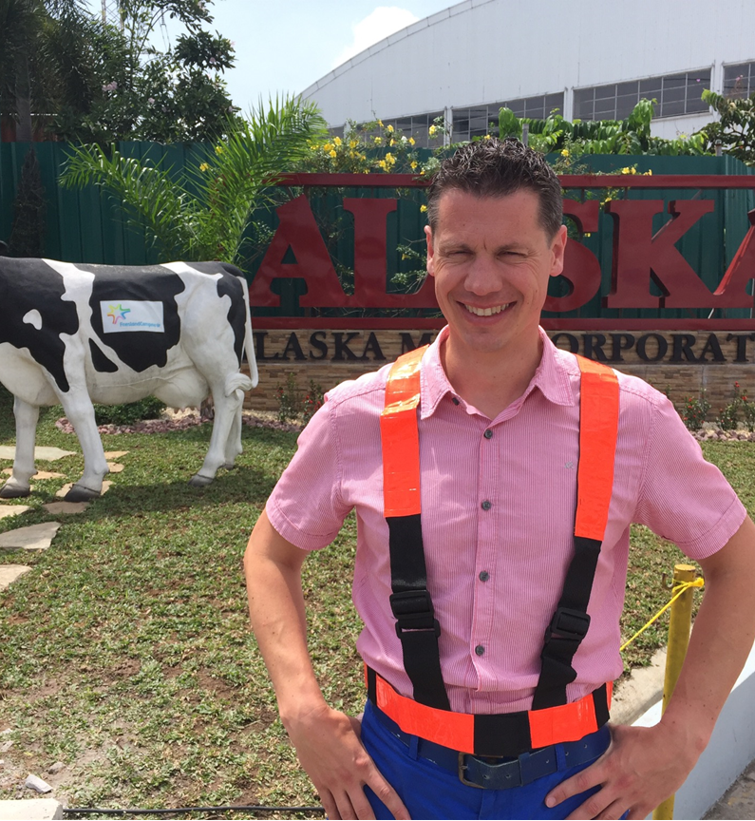Title
Blog by Erik Gort, Global Project Portfolio Manager
Military-trained at the Royal Military Academy, sent on missions to Afghanistan, Bosnia and Macedonia and now a valuable employee at FrieslandCampina — As Global Project Portfolio Manager, Erik Gort is responsible for the harmonisation and professionalisation of the management of over 3000 projects. A job that requires leadership, strategic thinking and analytic expertise. In this blog, Erik gives some insight in what led him to FrieslandCampina and how his background as a military man has benefited him in his current position.
Title
‘Culture shock’ at FrieslandCampina
Leaving the Dutch army after serving for almost 15 years to start a new job at a dairy company; it might not sound like the most obvious career path. So, when Erik is asked what brought him to FrieslandCampina, he explains: “Being sent on a mission was like playing ‘Champions League’: it’s the highest attainable to achieve in the army. I had done everything I wanted there, so it was time to look for a new challenge. Time for a new perspective.” This new challenge turned out to be FrieslandCampina, first as Project Portfolio Manager at the Innovation Center. A position that caused much more of culture shock than you might think.
All of a sudden, I was surrounded by scientists at the Research Centre of FrieslandCampina. It was a complete new way of communicating with colleagues from what I was used to in the army.
Nevertheless, Erik’s experiences as staff officer in the army also gave him the valuable skills that were needed for a career switch. He explains how his responsibilities as project and portfolio manager in the army were valuable for his new responsibilities at FrieslandCampina: “Translating strategies into initiatives and setting up assignments to the different operating companies, for example, is in some ways quite similar to developing strategies for the army. Moreover, it is all about delegating the right tasks at the right time.”
Title
Military Background
To learn more about Erik’s military background, we must go back tot 1997, when Erik chose to enter the army and enrolled at the Royal Military Academy. During his officer’s training, Erik completed his Bachelor in Military Business Administration and learned everything about strategy-making, logistics, leadership and more. After three years of training the program was complete. Still at the age of 22, Erik was ready for his first mission as platoon commander. Leading his platoon of twenty-five to forty soldiers, Erik learned to accept and handle high levels of responsibility at a very young age. It would bring him to an operational management function within the Royal Netherlands Army, where he would provide leadership to personnel equaling more than 125 FTE. After missions to Macedonia, Bosnia and Afghanistan (twice), Erik decided to take a new step in 2007. He started working for the army’s knowledge centre, putting into practice the lessons he had learned during his time ‘on the ground’. His new function included, among others portfolio management and directing the development and structure of projects within the organisation. As part of this new step, Erik enrolled for the Master’s program in Management Sciences.
Title
Communicating with different cultures
In 2017, it was time for a new step within FrieslandCampina. Erik continued his career path as Global Project Portfolio Manager, combining this function with his role as global trainer for the FrieslandCampina PPM Academy. In this role Erik works with colleagues from different countries and cultures, which makes the lessons learned during his missions abroad very welcome.
During my time in Afghanistan, I already learned to adapt to different cultures and customs. To mention an example, when I was on my first mission to Afghanistan in 2003, I had to work with twelve different nationalities in order to maintain safety in Kabul. From a Spanish EOD (explosive ordnance disposal), soldiers from Denmark to a medic from Singapore.
Furthermore, his work in the army required discipline, empathy and strong communication skills. But not only within his own platoon or with allies, but also with the local Afghan community. Communicating with local mayors, generals or ‘malik’ – Afghan for village elder – was as much a part of the mission as fighting the Taliban. “These are the experiences I cherish, because they are still useful in my current work.” Erik gives an example: “When I was giving a training in Asia for FrieslandCampina, one of the trainees was not paying attention, but instead constantly looking at his phone. However, I did not correct him in front of his peers, but decided to take him apart and asked him to put his phone away. It may sound simple, but it’s an important difference. Where in the Netherlands I could just have said this out loud, this would have meant a huge loss of face in Asia. When communicating with different cultures, such details are really essential.”
Title
Companionship
Finally, when Erik is asked what he is still missing from his time in the army, he responds: “The companionship with colleagues is completely different here, of course. The adventures we had in the army give an extra dimension to the team.” He continues with a smile: “But also the level of discipline is incomparable”. The many differences notwithstanding, Erik also finds an important common denominator between the army and FrieslandCampina: “Both in the army and at FrieslandCampina, everyone is so passionate about their work. In the army, it was all about contributing to a greater good. Here, it’s the drive to make products and processes better and better and to give back a good share to the farmers, every single time. We all have a passion for what we do. That makes it a real team.”
